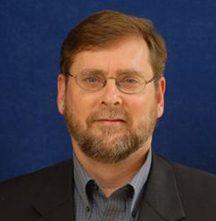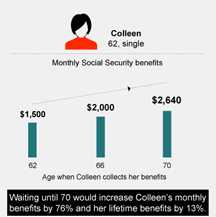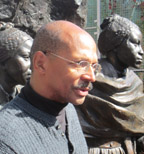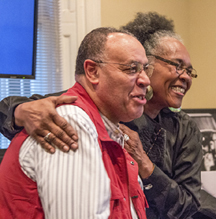If Opening From an E-mail,
Click Here for Better Viewing
Thanks President and Mrs. Obama For 8 Years of Diversity & Inclusivity
November 10 – November 23, 2016
On The Dock This Issue:
 |
Your Retirement and Social Security Expansion Steven Hill offered facts and took the time to make otherwise complex systems easy to understand, and most importantly, to act upon. | |
|---|---|---|
| Social Security Tips for Singles These rules are complex, however, and you should consider speaking with a Social Security representative. |
||
| Free Vegan 101 Guide The free guide is very colorful, diverse, factual, and practical. |
||
| The Hard Road to Ending Slavery in Maryland What took Maryland so long? Historian C.R. Gibbs explains how Maryland’s elites split over what course to follow. |
||
| Africans Say International Justice System is Rigged In October, Burundi became the first country to withdraw from the International Criminal Court (ICC). South Africa and Gambia quickly followed. |
||
| New Market Segments Marketers use the segments to understand and respond to consumers. |
||
| Activities Interesting, diverse things to do |
||
| Readers' Trends Port Of Harlem, Pinterest, and Facebook (Add to our more than 845 LIKES) |
With so much talk about tackling “structural” racism and the “system” being rigged, it was awfully refreshing to read “Expand Social Security NOW! How to Ensure Americans Get the Retirement They Deserve.” I appreciate that the author, Steven Hill, did not use inflammatory sound bites to explain how the structure of the social security system creates outcomes that do not benefit the masses of Americans. Instead, he offered facts and took the time to make otherwise complex systems easy to understand, and most importantly, to act upon.
Contrary to calls to stifle and even cut social security benefits, he offers solutions on how to expand social security so more people in the United States, children and adults, can have the secure safety net he believes they deserve. Essentially, he talks about the American approach to saving for retirement being a stool with three legs:
But, after following the discussions on the unfairness of the tax system and income and wealth inequality for some time, what I found most mind shattering is the deceitful language we have come to use surrounding social security. The former senior fellow at the New America Foundation writes, “even the language we use to describe social security is “rigged” to make voters believe it is a handout, when it is not since virtually all recipients have had to pay premiums over the course of their lifetimes in order to receive the benefits.”
Contrary to calls to stifle and even cut social security benefits, he offers solutions on how to expand social security so more people in the United States, children and adults, can have the secure safety net he believes they deserve. Essentially, he talks about the American approach to saving for retirement being a stool with three legs:
- Private, employer-based retirement like pensions and 401(k)s
- Personal Savings centered around homeownership
- Social Security
- “By 2011, the percentage of in-his-hands-sector workers covered by company pensions had dropped from 40 percent to 15 percent.” On 401(k)s, he writes: “It can be a really great deal – but only if you earn enough income to participate.”
- Beyond the affect that the housing crisis had on personal savings and wealth, he points to a 2015 US Federal Reserve survey that found that 47 percent of households said they do not have enough resources to meet an unexpected expense of $400. The result: “Nearly half of all households have virtually no retirement savings.”
But, after following the discussions on the unfairness of the tax system and income and wealth inequality for some time, what I found most mind shattering is the deceitful language we have come to use surrounding social security. The former senior fellow at the New America Foundation writes, “even the language we use to describe social security is “rigged” to make voters believe it is a handout, when it is not since virtually all recipients have had to pay premiums over the course of their lifetimes in order to receive the benefits.”
“All workers pay 6.2 percent of their wages into Social Security and 1.45 percent for Medicare, while the employer matches those amounts,” he explains. (One can argue that even employer contributions are taken out of the workers’ wages, since the money goes into paying premiums, instead of higher wages and salaries.) Being non-partisan, Hill questions why Republicans and even Democrats call Social Security and Medicare “entitlements,” and not “earned benefits,” or “social insurance.”
“Even the language we use to describe social security is “rigged” to make voters believe it is a handout, when it is not since virtually all recipients have had to pay premiums over the course of their lifetimes in order to receive the benefits.”
He also calls on ending tax deductions (subsidies) for 401(k)s, which largely benefit people in the top 20 percent income bracket, and for doubling the amount of social security payments. He suggests paying for his proposals by taxing all income equally and taxing unearned income (income on investments).
The San Franciscan explained, “Capital gains is the profit made from investment income. A person who earned $500,000, for instance, is taxed at 39.6 percent, but if they made the same amount in the stock market or in real estate investment, they would pay only 20 percent or in some cases even lower.” The Congressional Budget Office estimates that the policy costs the federal treasury $161 billion in 2013. Again, that is $161 billion that all tax payers have to bear.
Event Note:
 Thursday, November 17, 6:00 p.m. – 8:00 p.m.
Thursday, November 17, 6:00 p.m. – 8:00 p.m.
Lecture – Expanding Social Security and You - Forty-six percent of African Americans rely on Social Security for more than 90 percent of their retirement income and Social Security makes up an average of 52 percent of household income for those who are 65 and older. Three million children directly benefit from Social Security, and a growing number of children who live with their grandparents indirectly benefit. Restoring the student benefits program dropped in 1981 would make college more affordable.
Sarah Murphy Gray (pictured above), the Senior Policy and Program Associate at the Center for Global Policy Solutions, leads a discussion on the program’s importance and how expanding the program can help close the racial wealth gap.
Free | Register
“Even the language we use to describe social security is “rigged” to make voters believe it is a handout, when it is not since virtually all recipients have had to pay premiums over the course of their lifetimes in order to receive the benefits.”
He also calls on ending tax deductions (subsidies) for 401(k)s, which largely benefit people in the top 20 percent income bracket, and for doubling the amount of social security payments. He suggests paying for his proposals by taxing all income equally and taxing unearned income (income on investments).
The San Franciscan explained, “Capital gains is the profit made from investment income. A person who earned $500,000, for instance, is taxed at 39.6 percent, but if they made the same amount in the stock market or in real estate investment, they would pay only 20 percent or in some cases even lower.” The Congressional Budget Office estimates that the policy costs the federal treasury $161 billion in 2013. Again, that is $161 billion that all tax payers have to bear.
Event Note:
 Thursday, November 17, 6:00 p.m. – 8:00 p.m.
Thursday, November 17, 6:00 p.m. – 8:00 p.m.Lecture – Expanding Social Security and You - Forty-six percent of African Americans rely on Social Security for more than 90 percent of their retirement income and Social Security makes up an average of 52 percent of household income for those who are 65 and older. Three million children directly benefit from Social Security, and a growing number of children who live with their grandparents indirectly benefit. Restoring the student benefits program dropped in 1981 would make college more affordable.
Sarah Murphy Gray (pictured above), the Senior Policy and Program Associate at the Center for Global Policy Solutions, leads a discussion on the program’s importance and how expanding the program can help close the racial wealth gap.
Free | Register
Consider this hypothetical example: Ann is 62-years-old and is eligible to receive $1,050 if she were to claim Social Security this year. Her husband, John, had begun receiving his monthly benefits of $1,500 at age 62, but he died this year at age 66. If Ann claims her benefits now before her full retirement age (FRA) of 66, she would receive a survivor benefit of $1,215 per month –80% of John’s benefit –and an amount higher than her own benefit of $1,050.
If you are a surviving spouse, Social Security automatically defaults to the higher amount—in this case, her survivor benefit. Alternatively, she can elect to receive survivor benefits to age 70, and then switch to her own benefits. By then, her own benefits would have increased to $1,980 a month, a 76% increase in monthly benefits. Ann would earn more than $115,000 in extra payments if she lived to age 88, boosting her lifetime benefits by about 40%. These rules are complex, however, and you should consider speaking with a Social Security representative.
Read the full story from Fidelity
Read the full story from Fidelity
Tracye McQuirter, MPH, public health nutritionist, 30-year vegan, and national best-selling author of “By Any Greens Necessary,” has teamed up with Farm Sanctuary to provide the free, downloadable African American Vegan Starter Guide. The guide aims to show African Americans simple ways to begin a plant-based lifestyle.
The guide includes historical facts, a list o celebrity plant-based eaters, resources, and very practical interviews and testimonials. The free guide is very colorful, diverse, factual, and practical, but McQuirter says what makes her most proud of the guide are "the multiple voices and perspectives from our 12 African American vegan experts, through articles, interviews, recipes, and research."
By the time Maryland got around to ending slavery, 152 years ago, the Confederacy was within months of collapsing, Black people in the District of Columbia had been free more than two years and President Lincoln had declared emancipation in the South more than a year and a half earlier.
What took Maryland so long? Historian C.R. Gibbs explains how Maryland’s elites split over what course to follow, how heroic fighting by Black soldiers in the Union army affected public opinion, and, once a new state constitution to abolish slavery was put to referendum, how close the vote was. Listen to the Conversation of WYPR - Baltimore
What took Maryland so long? Historian C.R. Gibbs explains how Maryland’s elites split over what course to follow, how heroic fighting by Black soldiers in the Union army affected public opinion, and, once a new state constitution to abolish slavery was put to referendum, how close the vote was. Listen to the Conversation of WYPR - Baltimore
Event Note:
Friday, November 11, 6:00 p.m. – 8:00 p.m.
Lecture - A Dawn Like Thunder: Africa, Black America, and World War II by CR Gibbs - The noted historian and Port Of Harlem Magazine contributor discusses the often neglected role African people played in WWII and the impact it had on Africa and Diaspora, and the interactions between all three. Free | Register
Friday, November 11, 6:00 p.m. – 8:00 p.m.
Lecture - A Dawn Like Thunder: Africa, Black America, and World War II by CR Gibbs - The noted historian and Port Of Harlem Magazine contributor discusses the often neglected role African people played in WWII and the impact it had on Africa and Diaspora, and the interactions between all three. Free | Register
In October, Burundi became the first country to withdraw from the International Criminal Court (ICC). South Africa and Gambia quickly followed. Kenya is expected to be next. The ICC cannot arrest individuals itself; it relies on countries who participate in the court to make arrests.
The Associated Press notes there are concerns that more African countries will leave the court given longstanding objections to the ICC's focus on the continent - - that every person tried by the ICC has been African.
The Associated Press notes there are concerns that more African countries will leave the court given longstanding objections to the ICC's focus on the continent - - that every person tried by the ICC has been African.
The ICC was created in 1998 and opened in July 2002. It is the first legal body with permanent international jurisdiction to prosecute genocide, crimes against humanity, and war crimes. Notable countries that have not become states parties include the United States, China, Russia, and India. It had 124 members before Burundi and South Africa departed.
United Nations Secretary-General Ban Ki-moon expressed regret the countries want to leave the ICC reported Reuters and said it could "send a wrong message on these countries' commitment to justice."
United Nations Secretary-General Ban Ki-moon expressed regret the countries want to leave the ICC reported Reuters and said it could "send a wrong message on these countries' commitment to justice."
Nielsen released a new product called the Nielsen Intercultural Affinity Segmentation in response to America’s growing multi-cultural society. The new product divides consumers into five segments. Marketers use the products with its segments to understand and respond to consumers. Nielsen created these five segments:
- Monoculturals: Consumers who do not experience or participate in diverse lifestyles or tastes other than their root culture.
- Sideliners: Consumers who are aware of but generally uninvolved in diverse tastes and preferences, and often experience more opportunity and less avoidance of diverse experiences.
- Explorers: Consumers who experiment with and have tried diverse tastes and preferences on a limited basis.
- Enthusiasts: Consumers who are exposed and embrace diverse tastes and preferences. They are practicing, but not leading these experiences.
- Ambiculturals: Environment and lifestyle leaders, these consumers are considered influencers with effortless affinity to diverse tastes, preferences and high desire to share experiences with others.
Washington
Straight White Men
Studio Theater
9th and P, NW
through Sun, Dec 18, 2016, $
Lecture - A Dawn Like Thunder: Africa, Black America, and World War II
CR Gibbs
Alexandria Black History Museum
902 Wythe Street
Fri, Nov 11, 6p–8p
Free | Register
Veteran's Day Wreath Laying Program
African American Civil War Museum
1925 Vermont Avenue, NW
Fri, Nov 11-11a-1p, free
Meet the Nation's First Muslim Judge
Hon. Adam A. Shakoor
America’s Islamic Heritage Museum
2315 Martin Luther King Jr. Ave, S.E
Sat, Nov 12, 2p-4p, free
Chef Series: Senegalese Cuisine Source to the Bowl
Conversation between Chef Pierre Thaim and Jessica Harris
National Museum of African American History and Culture
1400 Constitution Avenue
Thu, Nov 17,7p-9p, free
Straight White Men
Studio Theater
9th and P, NW
through Sun, Dec 18, 2016, $
Lecture - A Dawn Like Thunder: Africa, Black America, and World War II
CR Gibbs
Alexandria Black History Museum
902 Wythe Street
Fri, Nov 11, 6p–8p
Free | Register
Veteran's Day Wreath Laying Program
African American Civil War Museum
1925 Vermont Avenue, NW
Fri, Nov 11-11a-1p, free
Meet the Nation's First Muslim Judge
Hon. Adam A. Shakoor
America’s Islamic Heritage Museum
2315 Martin Luther King Jr. Ave, S.E
Sat, Nov 12, 2p-4p, free
Chef Series: Senegalese Cuisine Source to the Bowl
Conversation between Chef Pierre Thaim and Jessica Harris
National Museum of African American History and Culture
1400 Constitution Avenue
Thu, Nov 17,7p-9p, free
Lecture – Expanding Social Security and You
Sarah Murphy Gray
Alexandria Black History Museum
902 Wythe Street
Thu, Nov 17, 6p–8p
Free | Register
23rd Annual Caribbean American Heritage Awards
Hyatt Regency on Capitol Hill
400 New Jersey Ave NW
Fri, Nov 18, 6:30p, $
Workshop - Photography with Two Historical Photographers
Sharon Farmer and George Tolbert
Alexandria Black History Museum
902 Wythe Street
Sat, Nov 19, 11a–1:30p
$5 | Register
California
San Diego Bay Wine + Food Festival
Mon, Nov 14-Sun, Nov 20, $
New York
Nigerian Film: Something Happened On The Way To West Africa!
Cantor Film Center-NYU
36 East 8th Street (between University Place and Greene Street)
Wed, Nov 16, 6p, free
TV
Sharon Farmer and George Tolbert
Photography with Two Historical Photographers
WUSA-TV- Channel 9
Great Day Washington
Mon, Nov 14, 9a, Free
Sarah Murphy Gray
Alexandria Black History Museum
902 Wythe Street
Thu, Nov 17, 6p–8p
Free | Register
23rd Annual Caribbean American Heritage Awards
Hyatt Regency on Capitol Hill
400 New Jersey Ave NW
Fri, Nov 18, 6:30p, $
Workshop - Photography with Two Historical Photographers
Sharon Farmer and George Tolbert
Alexandria Black History Museum
902 Wythe Street
Sat, Nov 19, 11a–1:30p
$5 | Register
California
San Diego Bay Wine + Food Festival
Mon, Nov 14-Sun, Nov 20, $
New York
Nigerian Film: Something Happened On The Way To West Africa!
Cantor Film Center-NYU
36 East 8th Street (between University Place and Greene Street)
Wed, Nov 16, 6p, free
TV
Sharon Farmer and George Tolbert
Photography with Two Historical Photographers
WUSA-TV- Channel 9
Great Day Washington
Mon, Nov 14, 9a, Free
| From the Last Issue | On Pinterest | On Facebook | On Website | |||
|---|---|---|---|---|---|---|
 A Port Of Harlem Fall at the Alexandria Black History Museum |
 No More Condoms? |
 From the National Black Anthem: True to our God, true to our native land. |  |















